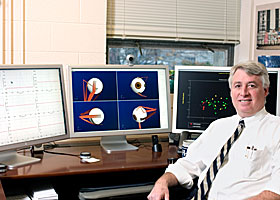  |
| HOME | THIS ISSUE | CALENDAR | GRANTS | BACK ISSUES | < BACK | NEXT > |
AAUP honors biomedical engineering professor for serviceby Sherry Fisher - November 6, 2006 |
||||
| "I've always had a vision of helping people," says Professor John Enderle, a biomedical engineer. "The field of biomedical engineering opened up a new realm of possibilities." Biomedical engineering applies engineering knowledge and technology to problems in medicine and biology. Enderle, a professor in the Department of Electrical and Computer Engineering, is the founding director of the undergraduate biomedical engineering program at UConn. When he was younger, Enderle had thought about becoming a physician. "It worked out well that I didn't," he says. "I'm having the time of my life in this career." Now he has been honored with the American Association of University Professors (AAUP) excellence in service award. The award is given for professional service that impacts citizens of the state, contributes to the common good at national or international levels, enhances the visibility of the University among prospective students, promotes program excellence, and fosters cooperative activities within the University. "I love what I'm doing," he says. "I'm writing textbooks, teaching very bright students, and working on cutting-edge research." He also enjoys being editor-in-chief of EMB Magazine , running a national senior design competition to help people with disabilities, and editing a book each year for the National Science Foundation on projects that have been designed. As part of the U.S. Department of Education's Research Center on Accessible Medical Instrumentation, Enderle is responsible for a national design competition open to senior engineering students across the U.S. "The goal is many-fold," Enderle says, "but essentially, it's to help people with disabilities to be able to better interface with society and life. For example, sometimes people in wheelchairs need to monitor their weight daily. We would design something for them to do that. A person with diabetes who is blind, might need a special device to treat him or herself." He is involved in the National Science Foundation senior design program, building design projects for people with disabilities. Students interview Connecticut residents who have disabilities, and work in teams to build devices to help them. After a project is completed, it is given to the person with the disability. Projects have ranged from special jar openers for people with arthritis and exercise devices for the disabled, to special toys and bicycles. One project involved a lift for an elderly couple who couldn't take groceries up the stairs. Through a collaboration with a colleague of Enderle's at Ohio University, UConn students also build projects for people with disabilities in a poor area of southeastern Ohio, who are clients of an arts program known as Passionworks.
Projects have included head-mounted drawing devices and electronically adjusted easels. Enderle received the Institute of Electrical and Electronics Engineers (IEEE) Engineering in Medicine and Biology Society's service award in 2004. His accomplishments led to his achieving the rank of Fellow of the IEEE, Biomedical Engineering Society, and the American Institute for Medical and Biological Engineering. He was also elected a member of the Connecticut Academy of Science and Engineering in 2003, was instrumental in the creation of the Biomedical Engineering Alliance for Central Connecticut, and is a member of ABET, the U.S. accreditor of college and university programs in applied science, computing, engineering, and technology. Robert Magnusson, professor of electrical and computer engineering, says Enderle "has shown outstanding dedication to service. He built the biomedical engineering program from scratch, and deserves credit for building significant enrollment in the program. We're also very pleased that the program attracts a significant number of female students." There are 200 undergraduates in the biomedical engineering program, about half of whom are females. Jack Winters, a professor of biomedical engineering at Marquette University, says, "John Enderle's national service has been exemplary. I can't think of another colleague, nationwide, who has provided more service than he. He's a leader within the biomedical engineering academic community, especially in areas of accreditation and design education." Donna Hudson, a professor of family and community medicine at the University of California, San Francisco, says Enderle's "written contributions to biomedical engineering education, both in his research and in the EMB Magazine, will leave a lasting legacy for new generations of students and professionals alike." Hudson also noted Enderle's "extensive contributions" to the IEEE Engineering in Medicine and Biology Society, including serving as student activities chair, health care engineering policy committee representative, and vice-president for member and student activities, and president and conference chair for the International EMBS Conference in 2000. Enderle, a 1998-99 University Teaching Fellow, recently received the Theo Pilkington Outstanding Educator Award from the American Association for Engineering Educators. He has co-authored one of the most popular textbooks in biomedical engineering used around the world. Enderle was also instrumental is starting a study-abroad program for biomedical engineering students. "We have agreements with six universities, and are in the process of signing up another half dozen," he says. "Our goal is to create global leaders in biomedical engineering. Study abroad will help us do that." |
| ADVANCE HOME UCONN HOME |

